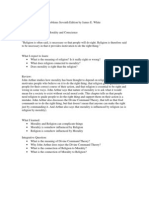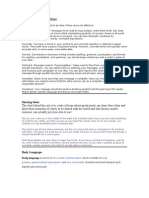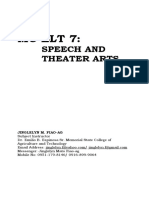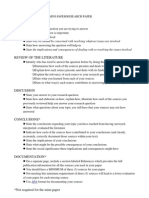Assignment 3
Uploaded by
Nur AzizahAssignment 3
Uploaded by
Nur AzizahNur Azizah
20400122063
PBI C
https://youtu.be/42h1L9EQxsw?si=toDm2M8J0Z4uwPP_
1. In order to able to produce speech, the mind goes through stages, what stages are they?
= three main stages namely;
a. The conceptualization stage (the stage for determining what intentions will be conveyed),
b. The formulation stage (the stage for determining what should be used and how to express
the intentions that exist at the conceptualization stage),
c. The articulation stage (the stage for conveying intentions formed in the form of utterances
and expressions).
Lavelt's opinion is in line with Warren's view which says that language production always
begins with the presence of an intention (message) in our minds. The next, our minds will
work to plan and to choose words and sentence structures to represent the intention. Finally,
the intention represented in the form of vocabulary or sentences is articulated in the form of a
series of speeches or utterances
2. What do humans need in order to be able to function the stages? Explain your answer.
= To carry out these three stages, humans need knowledge of language which Chomsky call
as "Linguistic Competence" which consist of semantical knowledge, syntactical knowledge
and phonological knowledge, by which each knowledge will function at each stage.
3. Do you agree with saying that conceptualization needs semantic knowledge? Why, explain
the reasons for you position.
= Yess I agree. Because semantic is knowledge possessed by a person so that he/she is able
to formulate and determine the meaning or message to be conveyed before speaking.
Therefore, it's emphasized that anyone who wants to speak (produce meaningful speech)will
definitely meaning (abstract idea) in his or her mind.
4. What are the functions of semantic knowledge? Explain your answer with example.
= Function of semantical knowledge; categorization, generalization, problem-solving and
reasoning, communication and understanding and abstract thinking. For example; when
someone says "apple" our knowledge of its characteristics (fruit, edible, red or green).
5. What do you know of semantical micro planning and semantical macro planning? Explain
your answer with examples.
= Semantical macro planning refers to the action of a speaker to determine what types of
speech acts can be used to express concepts (abstract ideas) in hir mind effectively.
Meanwhile, semantical micro is an action taken by a speaker in determining and using the
type of speech act used to communicate messages in his mind and which facts will be used
as the main focus to be highlighted so that key can be conveyed to the other party.
6. If conceptualization take place in the brain, which part of the brain runs the functions?
Explain your answer with theory and example.
= Pre - linguistics process occur in Wernicke's area. Wernicke's area carries out two functions,
namely conceptualization and formulation. Then, the result of conceptualization and
formulation are followed up by Broca's area whose role is to carry out the function of
articulation or speech production. Example, if you think about the concept of "bicycle" your
brain pull together sensory detail (shape,color) from visual areas and motor knowledge (how
to ride) from motor related areas to from the complete concept of a bicycle.
You might also like
- Empower Your Heart With Breakthrough Nitric Oxide Therapy - Tammy Hester100% (3)Empower Your Heart With Breakthrough Nitric Oxide Therapy - Tammy Hester20 pages
- Innovations in Portland Cement Manufacturing80% (5)Innovations in Portland Cement Manufacturing1,283 pages
- Stastical Physics: The Energy DistributionNo ratings yetStastical Physics: The Energy Distribution17 pages
- John Arthur Religion Morality and ConscienceNo ratings yetJohn Arthur Religion Morality and Conscience3 pages
- psychology-unitiii-thinking-200426103049No ratings yetpsychology-unitiii-thinking-20042610304937 pages
- Psychology Unitiii Thinking 200426103049No ratings yetPsychology Unitiii Thinking 20042610304937 pages
- Unit Iii-Thinking Skills: Thinking Can Refer To The Act of Producing Thoughts or The Process of ProducingNo ratings yetUnit Iii-Thinking Skills: Thinking Can Refer To The Act of Producing Thoughts or The Process of Producing17 pages
- GE ENG 101 Lesson1 OverviewoftheSpeechComProcessNo ratings yetGE ENG 101 Lesson1 OverviewoftheSpeechComProcess5 pages
- GAD-based Ic CEBU Lesson Exemplar: (EN11/12OC-Ibe-18)No ratings yetGAD-based Ic CEBU Lesson Exemplar: (EN11/12OC-Ibe-18)4 pages
- Personal Development: Quarter 1 Module 8: Emotional Intelligence100% (1)Personal Development: Quarter 1 Module 8: Emotional Intelligence18 pages
- Notes English Communication in Everyday LifeNo ratings yetNotes English Communication in Everyday Life40 pages
- Week 6 Lecture-Listening Skill, Verbal Non-Verbal CommunicationNo ratings yetWeek 6 Lecture-Listening Skill, Verbal Non-Verbal Communication31 pages
- 4.2 What Is Metacognition?: Metacognitive KnowledgeNo ratings yet4.2 What Is Metacognition?: Metacognitive Knowledge4 pages
- Public Speaking and Debating - Complete Course - Pr. El HadariNo ratings yetPublic Speaking and Debating - Complete Course - Pr. El Hadari25 pages
- 1. Introduction to psycholinguistics-1 (2)No ratings yet1. Introduction to psycholinguistics-1 (2)13 pages
- Language Production: Presented By: Marissa Agnes Mada Maksimilianus Suldi Panca MuliaNo ratings yetLanguage Production: Presented By: Marissa Agnes Mada Maksimilianus Suldi Panca Mulia7 pages
- LT503 - Levels of Thinking in Language LearningNo ratings yetLT503 - Levels of Thinking in Language Learning20 pages
- Communication Skills Speaking and Listen PDFNo ratings yetCommunication Skills Speaking and Listen PDF5 pages
- WINSEM2024-25_BENG101L_TH_VL2024250500471_2025-02-27_Reference-Material-INo ratings yetWINSEM2024-25_BENG101L_TH_VL2024250500471_2025-02-27_Reference-Material-I38 pages
- Critical thinking Assignment Rahel G 1No ratings yetCritical thinking Assignment Rahel G 117 pages
- LAX TSA officers make shocking discovery inside woman's carry-on - Los Angeles Times (1)No ratings yetLAX TSA officers make shocking discovery inside woman's carry-on - Los Angeles Times (1)3 pages
- Approaches and Methods in Language Teaching (Jack C. Richards, Theodore S. Rodgers)No ratings yetApproaches and Methods in Language Teaching (Jack C. Richards, Theodore S. Rodgers)34 pages
- Topic 5 Day by Day Activities (Cooking and Food)No ratings yetTopic 5 Day by Day Activities (Cooking and Food)10 pages
- MAN Truck 2012 Emergency Responders GuideNo ratings yetMAN Truck 2012 Emergency Responders Guide86 pages
- CLC 12 - Capstone Draft Proposal WorksheetNo ratings yetCLC 12 - Capstone Draft Proposal Worksheet2 pages
- Junior Assistant in Telangana State Road Transport CorporationNo ratings yetJunior Assistant in Telangana State Road Transport Corporation23 pages
- Roland Barthes Writing Degree Zero 1953pdfNo ratings yetRoland Barthes Writing Degree Zero 1953pdf82 pages
- Multivariate Statistical Approaches in Archeology: A Systematic ReviewNo ratings yetMultivariate Statistical Approaches in Archeology: A Systematic Review7 pages
- Magic Mushrooms Change Brain Connections - Business InsiderNo ratings yetMagic Mushrooms Change Brain Connections - Business Insider4 pages



































































































